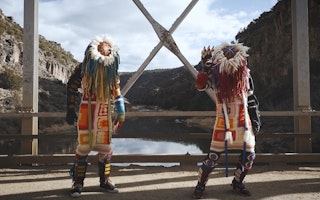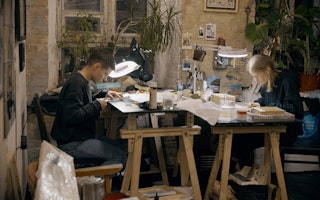Using Crafts to Find Common Ground

David Keefe is the founder of Frontline Arts, a nonprofit organization that has supported socially engaging art projects rooted in printmaking and papermaking for the past 10 years. From 2001 to 2009, Keefe served as a Sergeant in the United States Marine Corps, including a two-year tour of combat duty in Iraq as an infantry scout. As an Open Society fellow, he organized and facilitated workshops to bring veterans and non-veterans together through the transformative process of turning military uniforms into handmade paper. The Open Society Public Health Program spoke with Keefe about the ways in which art can help connect communities and foster social engagement.
What is “connective practice,” and how does it relate to the veteran community and to papermaking?
“Connective practice” uses craft-making to build alliances within communities and find commonality. This particular craft process is rooted in the ancient crafts of papermaking and printmaking, with what I refer to as a trace object: an object that has the same material experiences as the owner, such as a military uniform worn by a survivor of military sexual trauma, clothes worn by undocumented immigrants while migrating across the southern U.S. border, or scrubs worn by ill-equipped healthcare providers working against a pandemic.
A major focus of your work has been to change the culture of the “silent veteran.” How do you engage veterans to reflect upon and speak to their experience in the military?
Many veterans are misunderstood, marginalized, and left behind because their experience is so misunderstood by those who have never served in the military. There is little opportunity for veterans to tell their own story in a way that connects with others around them, without being overshadowed by the single-story veteran narratives in the media, and to work toward resilience, transformation, and connection, both personally and collectively.
With support from Open Society, you conducted art workshops with veteran and migrant communities in which participants made paper from uniforms and clothes with sentimental value to migrants. What did you aim to accomplish with these workshops?
It was my hypothesis that they have had similar experiences of struggle, oppression, and trauma. The more we explore these areas of commonality between communities, the more we can find ways to accept the differences among us.
What are the stories of some of the individuals who participated in your workshops?
One student from France was initially indifferent to the process of cutting up American uniforms. But as soon as she cut one up herself, she couldn’t stop crying and sobbing, experiencing a flood of memories about her grandfather who served for France in World War II. She was reliving the trauma of what French citizens endured from the Nazi onslaught for years.
I also met a migrant from Mexico who made paper from a shirt that was sentimentally connected to a story about a mother losing her infant child during migration across the border. Her poise and posture while making a mask out of her shirt, in the midst of the workshop commotion, was inspiring. Although she barely shed a tear, there was a palpable sense of her reliving a traumatic memory as she told the story.

What kind of work have you been doing during the COVID-19 pandemic?
In response to COVID-19, Frontline Arts started the Scrubs Paper Project, through which health care workers are making paper from their scrubs. This started as a postcard project, sending scrub paper in the form of blank postcards all over the place for participants to draw, write, or mark up based on their personal experiences with COVID-19 and the lockdown. It is now growing into an ongoing community project, very similar to our veteran papermaking project.
How can individuals from diverse backgrounds find common ground, experience, and purpose through art?
As I conducted this field work, I continued to realize that many feelings and experiences are universal among the veteran community, which is a microcosm of diverse American society. As we started to partner with other communities working to address related concerns, especially with the immigrant communities associated with Immigrant Movement International and their printmaking collective Mobil Print Power, I started to realize that there were real common struggles that we shared in trauma and complex post-traumatic stress, such as feelings of betrayal, moral injury, grieving and mourning, loss of purpose and meaning, culture shock, and transition. At the same time, we all shared an inherent desire to engage with each other through craft. In these moments, I would look up from the table and see veterans from multiple eras wearing a mixed bag of shirts, anywhere from eagles and flags to veterans against the war.
I have seen DACA (Deferred Action for Childhood Arrivals) recipients and veterans share their stories of post-traumatic stress disorder and complex post-traumatic stress disorder, finding commonalities. People from all parts of the political spectrum can put aside their differences to connect with fellow community members and share their experiences.
Using trace objects to create art wasn’t healing, but an acceptance, and a transformation that helped people tell their stories and to start to understand shared experiences. That’s why craft is a connective practice.


